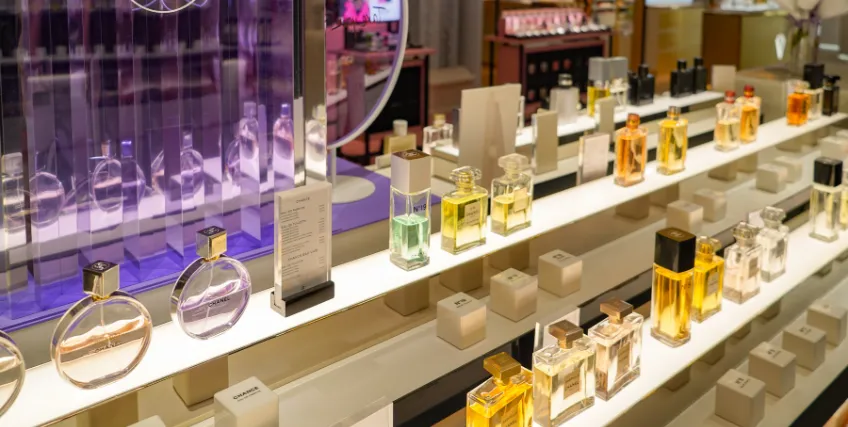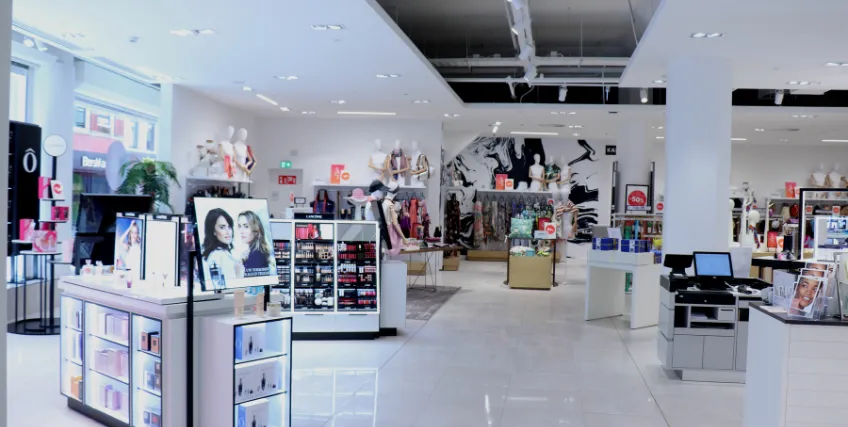How to Start a Perfume Business with the Right Small Business Loan
Sep 19, 2025 | Last Updated on: Sep 22, 2025

The perfume business is expected to grow to a global market size of more than $80 billion by 2030, according to Grand View Research. While celebrities may have their own perfume line or perfume brand, more entrepreneurial-minded fashionistas might be wondering how to start a perfume business. For the aspiring entrepreneur, sourcing and selling to a target market may be a more practical (and more lucrative) solution. But beyond the market research, chemistry, and essential oils is the challenge of getting a startup off the ground.
We explore how to start a perfume business by focusing on how to get the capital necessary to launch. Starting a business is never easy, but with the right perfume business loan, even beginners can break into the fragrance industry and start growing a business. From understanding the startup costs to exploring the different financing options, this guide will help you reach long-term financial health for your business.
In this article:
- Understand the initial costs and how to start a perfume business.
- Explore fragrance finance options, from term loans to business lines of credit.
- Learn a step-by-step guide to streamline perfume business loan applications and grow your fragrance business.
Startup Costs for a Perfume Business
The costs involved in figuring out how to start a perfume business can be significant. Few businesses get to the top of the mountain without borrowing capital along the way. The right lender can make all the difference. Some of the costs you must plan for include:
- Ingredients and raw materials: If your focus is on product development and bringing your own perfumes to market, you’ll need ingredients for formulation. Things like high-quality essential oils, fragrance absolutes, and perfumer's alcohol can be expensive, especially when purchased in bulk. But you still need to source and test to land on a signature scent, so you may spend significant sums before you’re ready to sell anything.
- Equipment and supplies: A small-scale operation might start with basic lab glassware, scales, and stirrers, but as you scale, you may need more sophisticated machinery, like automated bottling and labeling machines and a dedicated ventilation system.
- Inventory: If you’re sourcing perfumes from other fragrance brands in the perfume industry to sell at retail, acquiring that inventory can also be very expensive.
- Packaging and branding: Your packaging design isn’t just a way to contain your own fragrance. Whether you’re doing your own perfume making or just putting third-party perfumes in retail bags, packing is a direct representation of your brand's identity and values. Professional branding and design, custom bottles, and quality packaging materials cost money.
- Marketing and e-commerce: The profit margins in the competitive perfume market can be razor thin. You need to invest in a professional website or e-commerce platform, high-quality product photography, and digital marketing campaigns like social media ads and influencer partnerships to reach your target audience.
- Staff: In addition to chemists and retail employees, you may spend on salespeople to help open new distribution channels, like department stores, and marketing teams to use customer feedback and consumer preferences to inform marketing strategies and turn potential customers into loyal ones. Each new hire is one step towards learning how to start a perfume business.
- Legal and licensing Fees: Every legitimate business requires a business license, and a perfume business must also navigate regulations from bodies like the FDA. Trademarks for your brand name and logos are also crucial for protecting your intellectual property. These costs, while seemingly small individually, can add up quickly.
You might have a great idea of how to start a perfume business, but without capital, your business plan will struggle to get off the ground. There are many costs to consider.
Types of Small Business Loans for a Perfumery
When you know your budget, the next step in how to start a perfume business is to find the right loan option. There are many types of small business loans, each of which has advantages and disadvantages for different scenarios. We break down some of the most common below.
Term loans
The most common business loan, a term loan provides a lump sum of money upfront that you repay over a fixed period, usually with monthly payments based on an interest rate. Term loans are great for both large, one-time investments like purchasing bulk inventory, or as a more open-ended startup loan. The clear repayment schedule makes budgeting simple.
Traditional lenders, such as banks and credit unions, usually have stricter eligibility requirements and slower funding times than online lenders, but can offer higher loan amounts and lower interest rates.
SBA loans
The U.S. Small Business Administration (SBA) works with approved lenders to partially guarantee loans, meaning they’ll pay back a portion of the loan if the borrower defaults. Because of this, they’re often able to offer lower interest rates, longer repayment terms, and more manageable down payments than traditional term loans. SBA loans can be used for everything from working capital to real estate. If you're serious about how to start a perfume business and are willing to put in the effort for a comprehensive application, an SBA loan can be a cost-effective option.
Equipment financing
Equipment financing may be your best bet if you need specific machinery, like vehicles or manufacturing equipment. With these loans, the equipment itself serves as collateral, making it easier to qualify for and often resulting in lower interest rates.
Business lines of credit
You get approved for a maximum credit amount, but you only pay interest on the amount you withdraw. Since most lines of credit are revolving, once you repay what you’ve borrowed, you’ll have access to the full amount again. Lines of credit are useful as an emergency safety net, a cash flow bridge, as a tool to take advantage of business opportunities. A line of credit can be a crucial part of a comprehensive plan for how to start a perfume business.
How to Improve Your Loan Eligibility
Loans aren’t gifts or investments. You’re expected to pay it back within the negotiated timeframe and under the loan terms. Any lender needs to see you’re a responsible borrower and have a plan to repay the loan. That means thorough preparation for your loan application. Here are some tips to improve your approval chances:
- Create a comprehensive business plan: A business plan is your roadmap for how to start a perfume business. It should include an executive summary, a market analysis, a detailed breakdown of your products and operations, and, most importantly, financial projections. Lenders need to see how you plan to generate revenue and how you will repay the loan. For startups, a business plan can make or break your loan application.
- Work on your personal financial history: When you’re just starting out, lenders will primarily focus on your personal financial history. Even if you’ve been in business for a while, a lender will likely still scrutinize your personal credit history and finances. A strong personal credit history demonstrates a track record of responsible borrowing. Before applying, check your credit report for any errors and work to pay down any existing debt.
- Showcase industry expertise: If you have a background in chemistry, retail, or marketing, highlight this in your business plan. A deep understanding of your craft and the fragrance market will build confidence in your ability to execute your plan for how to start a perfume business.
- Know how you’ll use the funds: Don’t be generic and say you just need “startup costs." Instead, be specific about how every dollar of the loan will be used. For example: "$15,000 for initial ingredient inventory, $10,000 for packaging, $5,000 for website development and marketing." This level of detail shows you have done your homework.
Final Thoughts
A small business loan isn’t just for getting started; it can be a strategic tool to scale your business, too. Once you’ve mastered how to start a perfume business, a loan can help you scale production, launch major marketing campaigns, build an online presence, and much more. Whether you’re a brand new company still learning the hard way how to start a perfume business or you’re ready to rise to the next level, a small business loan can make a big difference in your company’s future.
FAQs About How to Start a Perfume Business
How much money do I realistically need to start a perfume business?
Startup costs will likely vary dramatically based on your business model. A small-scale, home-based operation focusing on a single product line might have very low overhead. A more professional brand with multiple scents, custom packaging, and a strong online presence will be much more expensive.
Can I get a small business loan if I have bad credit?
A strong credit score is a major factor, but it’s not the only one. Online lenders or microloan lenders may be more flexible and consider other factors, such as cash flow, personal assets, and the strength of your business plan. However, be prepared for potentially higher interest rates and stricter repayment terms.
What is the difference between a term loan and a working capital loan?
Working capital loans are typically a type of term loan. Generally, they’re designed for short-term, ongoing expenses, like day-to-day ingredient purchases, covering payroll, or funding a temporary marketing blitz. Term loans with longer repayment terms are often applied to a large, specific purchase, like inventory or equipment.
Do I need a business plan to get a loan for my perfume business?
Lenders need to see that you have a well-thought-out strategy, a clear understanding of your market, and a realistic financial forecast to recognize that you know how to start a perfume business.
How long does the small business loan application process take?
The timeline varies significantly depending on the loan type. Online lenders can offer quick funding decisions. Traditional bank loans and SBA loans, however, can take weeks or even months due to their rigorous application and underwriting processes. It's crucial to plan ahead and start the application process well before you need the funds.
Frequent searches leading to this page
Related Articles
Fragrance Finance: Popular Loan Options for Perfume and Cosmetic Businesses
September 22, 2025
How to Start a Perfume Business with the Right Small Business Loan
September 22, 2025
Tips to Start a Perfume Business with No Money: Creative Financing Options for Entrepreneurs
September 22, 2025
Term Loans are made by Itria Ventures LLC or Cross River Bank, Member FDIC. This is not a deposit product. California residents: Itria Ventures LLC is licensed by the Department of Financial Protection and Innovation. Loans are made or arranged pursuant to California Financing Law License # 60DBO-35839




